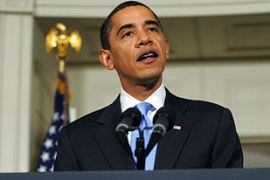US senate passes healthcare bill
Reforms “incredibly close”, says Obama, but months of wrangling not yet over.

“This is a victory for the American people. Those fortunate enough have health insurance will be able to keep theirs and those who do not will be able to have health insurance.
“We have affirmed that the ability to live a healthy life is a right and not merely a privilege for the select few.”
Battle not over
The early-morning Christmas Eve vote followed months of political wrangling that consumed the US congress and put a dent in Obama’s public approval ratings.
| in depth | |||||||||||||
|
Al Jazeera’s John Terrett, reporting from Washington DC, said the voting was along party lines, with all 60 Democrats turning out to vote in favour.
But, our correspondent added, there is a long way to go before the bill lands on the president’s desk, with tough negotiations due in January with the House of Representatives – which approved its own version on November 7 – to agree on a single bill.
Once house-senate negotiators agree on a single piece of legislation, each chamber must approve it again before sending it to Obama to sign into law.
Democrats hope to finish work before Obama’s State of the Union address in late January, but Manu Raju, a reporter for the Politico website, told Al Jazeera that there were significant differences between the House of Representative and senate bills.
The house, for example, wants to pay for the changes via wealthy individuals while the senate wants to use methods such as taxing high-end insurance plans.
“In the end the house is probably going to have to accept what the senate has passed because the senate is a much more difficult place to pass major legislation,” Raju said, referring to the Democrats’ greater dominance in the house, compared to the senate.
Biggest changes since 1965
The overhaul, Obama’s top legislative priority, would lead to the biggest changes in the $2.5 trillion US healthcare system since the 1965 creation of the government-run Medicare health programme for the elderly and disabled.
The bill may extend health coverage to more than 30 million uninsured, covering 94 per cent of all Americans, and halt industry practices such as refusing insurance to people with pre-existing medical conditions.
 |
| The bill may force insurance firms to cover those with existing conditions [Reuters] |
It also would require most Americans to have insurance, give subsidies to help some pay for coverage and create state-based exchanges where the uninsured can compare and shop for plans.
Major provisions such as the exchanges would not kick in until 2014 but many of the insurance reforms like barring companies from dropping coverage for the sick will begin in the first year.
Republican critics say the bill is an expensive and heavy-handed intrusion in the healthcare sector that will drive up costs, increase the budget deficit and reduce patients’ choices.
But the nonpartisan Congressional Budget Office estimates that the senate bill will cut the federal deficit by $132bn over 10 years.
Critics, however, argue that the expected revenue increases and cost savings may never materialise.
Passage of the bill is critical for Obama, whose political standing and legislative agenda could hinge on its success.
Raju said Obama’s campaign promise of universal healthcare had not been reached because the added cost was seen as too expensive. Illegal immigrants are also excluded from the bill.
“They wanted to keep this measure under $900 bn. To cover that last six per cent would have meant additional subsidies for these people to purchase insurance. That really would have escalated the cost.”
Still, he said: “This is the most dramatic restructuring of the American health care system in history.
“This is a major accomplishment that has eluded presidents and congresses for generations.”
He added that Obama now has a “major sales job” to convince Democratic liberals that the bill goes far enough and fulfils his campaign promise, while appeasing conservatives who say the bill goes too far.
“Otherwise he will have a big backlash in the [late] 2010 mid-term elections,” Raju said.
Obama’s public approval ratings have dipped to about 50 per cent in many polls as the acrimonious debate has dragged on.
